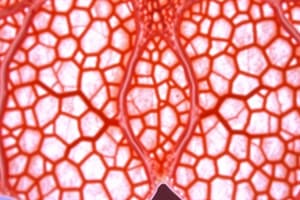Podcast
Questions and Answers
Which type of loose connective tissue is primarily responsible for thermal insulation?
Which type of loose connective tissue is primarily responsible for thermal insulation?
- Adipose tissue (correct)
- Dense connective tissue
- Reticular tissue
- Areolar tissue
Where is areolar connective tissue commonly found in the body?
Where is areolar connective tissue commonly found in the body?
- In the brain
- In bone marrow
- In cartilage
- Surrounding nerves and blood vessels (correct)
What is a key characteristic of brown adipose tissue?
What is a key characteristic of brown adipose tissue?
- It is found exclusively in adults.
- It is primarily involved in energy storage.
- It generates heat, which is vital for newborns. (correct)
- It makes up less than 10% of body weight.
What cells are predominantly found in reticular connective tissue?
What cells are predominantly found in reticular connective tissue?
Which type of loose connective tissue provides a structural framework for lymphatic organs?
Which type of loose connective tissue provides a structural framework for lymphatic organs?
Which type of dense connective tissue contains elastin fibers?
Which type of dense connective tissue contains elastin fibers?
What is the primary fiber type associated with both dense irregular and dense regular connective tissues?
What is the primary fiber type associated with both dense irregular and dense regular connective tissues?
Which cell type is predominantly found in both types of dense connective tissues?
Which cell type is predominantly found in both types of dense connective tissues?
What feature distinguishes dense irregular connective tissue from dense regular connective tissue?
What feature distinguishes dense irregular connective tissue from dense regular connective tissue?
In what type of connective tissue would you most likely find a greater number of blood vessels?
In what type of connective tissue would you most likely find a greater number of blood vessels?
Flashcards are hidden until you start studying
Study Notes
Loose Connective Tissue
- Subdivided into three main types: Areolar, Adipose, and Reticular
- Provides support and holds organs in place
Areolar Tissue
- Covers muscle fibers, ensuring structural integrity
- Located beneath the epidermis for cushioning and support
- Found surrounding mucous membranes, playing a protective role
- Envelops nerves and blood vessels, facilitating communication and circulation
Adipose Tissue
- Composed of a matrix of areolar tissue, crucial for energy storage
- White Adipose Tissue:
- Accounts for 20-25% of body weight
- Functions include supporting structures, providing thermal insulation, and serving as an energy reserve
- Brown Adipose Tissue:
- Generates heat, particularly important for newborns to maintain body temperature
Reticular Tissue
- Characterized by fine branching reticular fibers in a semi-solid matrix
- Contains reticular cells, monocytes, and lymphocytes, contributing to immune function
- Primarily found in lymph nodes and other lymphatic organs, playing a role in filtration and immune response
Dense Connective Tissue
- Two types: Dense Irregular and Dense Regular
- Dense Irregular:
- Composed of collagen fibers and fibroblasts, providing strength in multiple directions
- Contains capillaries and elastin for flexibility and nourishment
- Dense Regular:
- Made up of tightly packed collagen fibers aligning in one direction, providing tensile strength
- Contains fewer capillaries and fibroblasts compared to dense irregular tissue, leading to slower healing processes
Studying That Suits You
Use AI to generate personalized quizzes and flashcards to suit your learning preferences.




